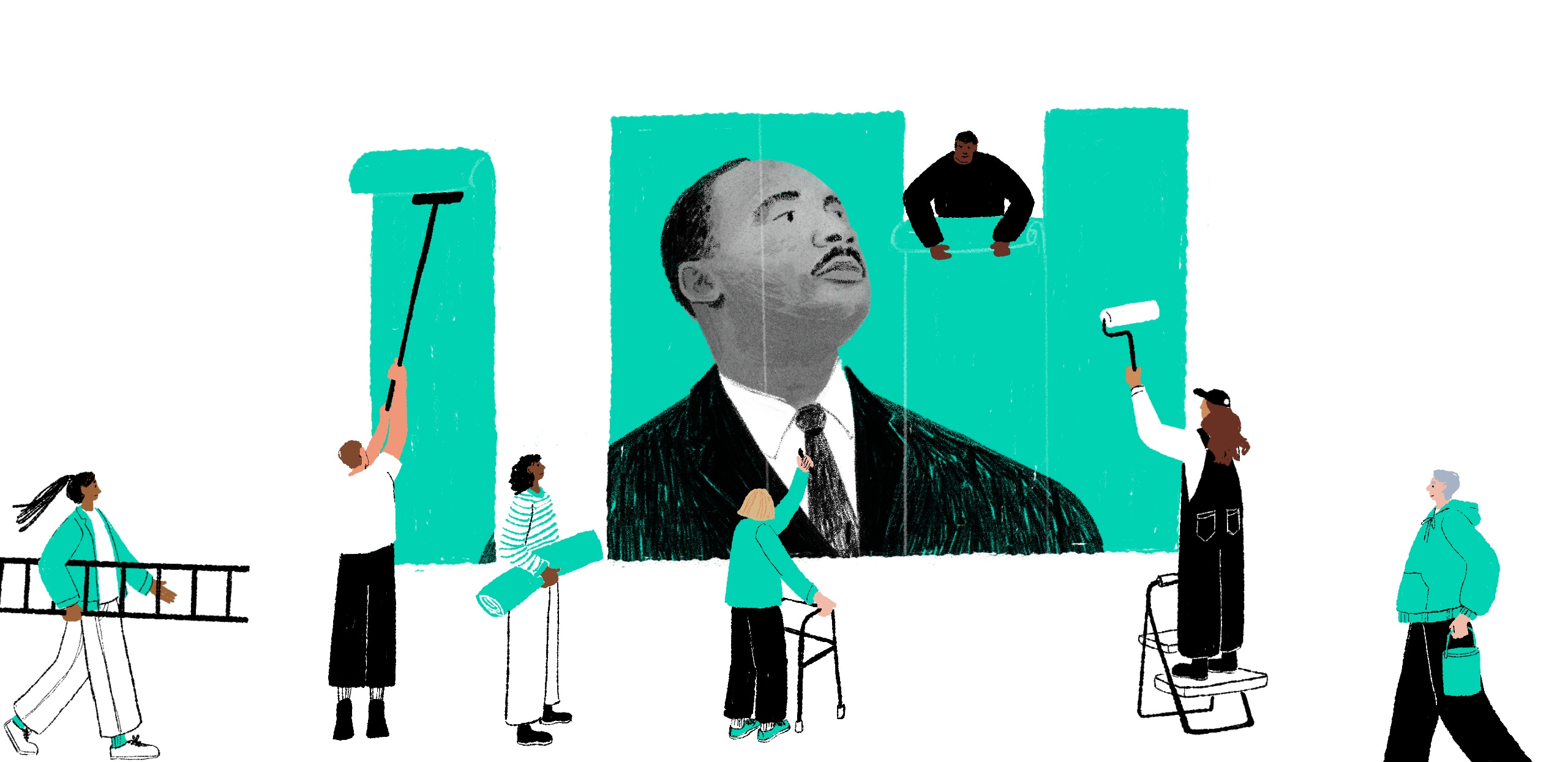Dr. Martin Luther King Jr.’s legacy lives on as we work for a world grounded in justice and compassion.

By Nico Archer
Partner
Our shifting political climate has created a chilling effect on DEI initiatives in corporate and academic settings. But the majority of companies — including the most innovative and forward-thinking ones — are staying the course, not backing away.
As we honor the legacy of Dr. Martin Luther King Jr., we’re reminded of his commitment to social justice. In the spirit of Dr. King’s dream, we must confront the current climate surrounding diversity, equity and inclusion with renewed determination.
“Injustice anywhere is a threat to justice everywhere. We are caught in an inescapable network of mutuality, tied in a single garment of destiny. Whatever affects one directly, affects all indirectly.”
In a recent survey of over 600 clients, Seramount found that “more than 80% of companies are maintaining their DEI efforts, with an additional 10% doubling down.”
Homegrown Pacific Northwest companies like Costco, Alaska Airlines and Microsoft are leading by example, along with others like Apple and Chewy, publicly reaffirming their commitment to DEI. They understand that DEI is not just a moral imperative, not just about justice, but integral to advancement. As Microsoft says, “Inclusion is innovation.”
Does DEI make sense for my company?
The short answer is yes. DEI makes good people and business sense.
- Research from Boston Consulting Group, based on a survey of over 27,000 employees in 16 countries, shows that DEI programs boost profits and employee commitment.
- McKinsey’s 2023 research shows a clear link between ethnic diversity and financial success. Companies with more diverse workforces are 39% more likely to outperform their peers.
- CultureAmp’s 2024 study showed companies prioritizing diversity see a 6.8% higher stock price. The study also showed that employees who believe their company values diversity are 84% engaged, compared with just 20% for those who don’t.
Why DEI matters now more than ever.
Imagine a workplace where everyone feels valued and respected. Where people, regardless of their background, succeed along with the companies that employ them. That’s the promise of DEI — a promise needed now more than ever, and one that demands our ongoing commitment to build a truly equitable future.
On inclusive hiring, multibillionaire Mark Cuban says, “I take it as a given that there are people of various races, ethnicities, orientation[s], etc. that are regularly excluded from hiring consideration.” He adds, “By extending our hiring search to include them, we can find people that are more qualified.”
We must acknowledge the pushback against DEI initiatives and the alarming trend of blaming DEI when things go bad (like with the recent Los Angeles fires). Some fear it will diminish opportunities for certain groups or lead to reverse discrimination. Others worry about the financial risks of discrimination lawsuits or believe DEI is simply a fad. Most recently, people have erroneously linked DEI to a decline in quality or service.
These fears are often rooted in misunderstanding and disinformation. It’s crucial to address these concerns with empathy and understanding, emphasizing that DEI is about creating a more inclusive environment for everyone, and not about taking away from anyone.
In 2025, expect to see some companies adapt their language and approaches to ensure the success of their DEI programs in response to pushback. As alternatives to “DEI,” organizations will lead with terms like “workplace engagement,” “inclusive innovation” and “people-first strategy” to emphasize their commitment to creating inclusive environments. On adapting DEI strategies, Yolanda Seals-Coffield, Chief People Officer at PwC, says, “We live in a world of cycles, and this isn’t the first time that the landscape is changing for organizations as they advance their inclusion efforts, and it will not be the last.”
We see questions and concerns about DEI as an opportunity for open and honest dialogue. Ultimately, it’s about building a more inclusive and equitable workplace where everyone can thrive and contribute their unique talents.
Moving from words to action.
Doubling down on DEI requires moving beyond words to take concrete action. It requires courage and accountability. We must be willing to challenge outdated practices and resist the urge to revert to comfortable but inequitable practices.
“The ultimate measure of a man is not where he stands in moments of convenience and comfort, but where he stands at times of challenge and controversy.”
Dr. Martin Luther King Jr., “Strength to Love”
Here are some key steps companies and organizations can take to strengthen their DEI efforts.
Build a stronger foundation by looking closely at your people, culture and practice.
Invest in diverse talent. Prioritize the recruitment and retention of underrepresented groups. Provide mentorship and sponsorship opportunities to help them advance.
Focus on culture. Create an environment where everyone feels safe, respected and valued. Encourage open dialogue and address microaggressions and other harmful behaviors.
Integrate DEI into practice and planning. Embed DEI into all aspects of the business, not just HR. Hold leaders accountable for DEI goals. Seek innovative solutions to challenges by looking at problems through a DEI lens.
Go beyond surface-level initiatives and critically examine your systems, practices and ways of thinking.
DEI in every department. Every department should have DEI goals and actions integrated into their strategic plans. This ensures that DEI is not siloed within HR or another specific team but is everyone’s responsibility.
Diversify production partners and vendors. Actively seek out and collaborate with diverse production partners and vendors. This brings in a range of lived experiences and perspectives, enriching the work and ensuring more authentic representation.
Challenge the status quo. We need to be willing to have difficult conversations and challenge existing norms. This includes critically examining internal practices to identify and eliminate any that perpetuate systemic racism or other inequities.
Invest in relationships. Building trust and fostering open dialogue is crucial. This means investing in relationships with employees, community partners and other stakeholders, and creating a culture where everyone feels safe to speak up, share power and share their perspectives.
Mindful resource allocation. Ensure that resources are allocated equitably and that decision-making processes include diverse voices. This helps prevent unintentional biases from influencing resource distribution.
DEI at DH: A closer look at how it fuels our work.
As a social impact agency, DEI is central to everything DH does. All our clients are committed to DEI, recognizing its importance in closing access gaps, ensuring their messages reach diverse communities, and effectively connecting people with essential services. We are constantly learning from our clients — and the communities and audiences they serve — and collaborating with them to advance DEI in our work.
Here are some of the ways we are learning and growing.
DEI Collaborative. Our team-led Equity Collaborative provides a space for employees to come together, discuss DEI topics, and identify opportunities for systems and structural improvement within our organization.
DEI action plan. The agency’s employee-driven priorities and strategies are advanced, recorded and tracked in a plan that is updated quarterly.
Diversity and anti-racism connection space. This group provides a safe and brave space for employees to engage in open and honest conversations about diversity, racism and allyship.
DEI coaching. We regularly engage with DEI coach Erin Jones to provide our team with ongoing training and development.
DEI pro bono investments. We use our time, expertise and resources to support organizations that center and serve underrepresented groups and communities.
The work ahead.
On this MLK Day and beyond, let us reflect on the important DEI work ahead of us. Let us recommit ourselves to Dr. King’s dream of a just and equitable world. Let us challenge ourselves and our organizations to be better, do better and ensure every voice is included, heard and listened to. By weaving DEI into the fabric of our work, we can create meaningful change and ensure that everyone has the opportunity to thrive.
“Actually, we who engage in nonviolent direct action are not the creators of tension. We merely bring to the surface the hidden tension that is already alive. We bring it out in the open, where it can be seen and dealt with.”
Dr. Martin Luther King Jr., “Letter from a Birmingham Jail”

Nico Archer, Partner
Nico Archer uses strategic communications to drive positive change in diverse sectors, including government, health care, energy, education, nonprofit and technology. With a focus on DEI, Nico also helps DH clients develop community engagement strategies and integrated campaigns rooted in equity-centered communications.

